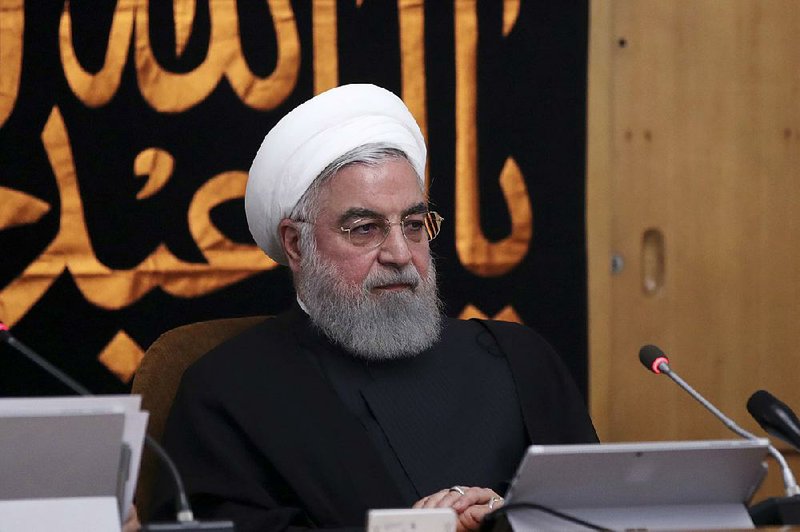TEHRAN, Iran -- Iran's president urged the U.S. on Wednesday to "put warmongers aside" as tensions roil the Persian Gulf in a dispute over the collapsing nuclear deal with world powers.
Hassan Rouhani's remarks signaled approval of President Donald Trump's dismissal of John Bolton as national security adviser. Bolton routinely was pilloried by Iranian Foreign Minister Mohammad Javad Zarif as part of a "B Team" that targeted Iran.
Bolton had for years been critical of Tehran and once promised before members of an Iranian exile group that they'd be celebrating the overthrow of Iran's government.
Bolton's departure also comes at a time when the White House is open to the possibility of Trump meeting with Rouhani during the coming U.N. General Assembly this month in New York, according to people familiar with the matter. Whether such a meeting materializes, however, remains in question.
"Americans have to realize that warmongering and warmongers are not to their benefit," the Iranian president said in televised remarks after a Cabinet meeting Wednesday. "They should not only abandon warmongering but also abandon their maximum pressure policy."
Rouhani, in a phone call with French President Emmanuel Macron later Wednesday, repeated his position that if Europe finalizes a way for Iran to sell its oil, then Iran would return to the nuclear deal's commitments.
He also reiterated that lifting U.S. sanctions would draw Tehran back to the negotiating table with world powers, though the post on his official website that detailed the call with Macron did not elaborate on what might be up for negotiation. Rouhani said that as long as sanctions remain, "negotiating with the U.S. makes no sense."
Trump has discussed easing sanctions on Iran to help secure the meeting with Rouhani later this month, and Bolton argued against such a step, according to three people familiar with the matter.
After an Oval Office meeting Monday when the idea came up, Treasury Secretary Steven Mnuchin voiced his support for the move as a way to restart negotiations with Iran, some of the people said. Later in the day, Trump decided to oust Bolton, whose departure was announced Tuesday.
Trump told reporters at the White House that he's "not looking at anything" with regard to a meeting with Rouhani, but he indicated that he may consider easing sanctions to make it happen. "We'll see what happens," he said after he was asked about backing off the sanctions, adding that he does not desire "regime change" in Iran.
Ali Rabiei, an Iranian government spokesman, said Wednesday that Bolton's dismissal may help the U.S. have a "less biased" attitude toward Iran.
Though he stressed that the dismissal was an internal U.S. issue, Rabiei called Bolton "the symbol of America's hawkish policies and its animosity toward Iran."
Zarif again used Twitter to write about what he calls the "B Team," which included Bolton, Israeli Prime Minister Benjamin Netanyahu, Saudi Crown Prince Mohammed bin Salman and Abu Dhabi Crown Prince Mohammed bin Zayed Al Nahyan, all critics of Iran.
Zarif said "the world -- minus 3 or 2 panicked cohorts -- was breathing a sigh of relief" after Bolton's ouster. "Thirst for war -- maximum pressure -- should go with the warmonger-in-chief," Zarif wrote.
Hard-liners, however, urged caution.
Gen. Mohsen Rezaee, a commander in the powerful Revolutionary Guard and its former chief, said in a tweet: "We will not be deceived by the sacrificing of Bolton."
Ali Shamkhani, a top Iranian security official and secretary of the Supreme National Security Council, said Bolton's exit has "no impact" on how Tehran views U.S. policy. He said what matters to Iran is U.S. "compliance with international commitments as well as lifting cruel and illegal sanctions," the semi-official Fars news agency reported Wednesday.
Last year, Trump pulled the U.S. out of the landmark 2015 nuclear deal that lifted sanctions on Iran in exchange for caps on Iran's nuclear program. The U.S. administration later intensified sanctions on Iran, slashing its sales of crude oil abroad and sending the country's economy into freefall.
In response, Iran has in recent months crept past the limits the nuclear deal imposed on uranium enrichment and its uranium stockpile. And over the weekend, Tehran announced that it would use advanced centrifuges prohibited under the deal.
Rouhani has called the use of faster centrifuges Iran's "third step" away from the nuclear deal. On Wednesday, he said that "if necessary, we will take other steps in future."
Information for this article was contributed by Amir Vahdat and Jon Gambrell of The Associated Press; and by Jennifer Jacobs, Saleha Mohsin, Jenny Leonard, David Wainer, Ivan Levingston, Jordan Fabian and Nick Wadhams of Bloomberg News.
A Section on 09/12/2019
